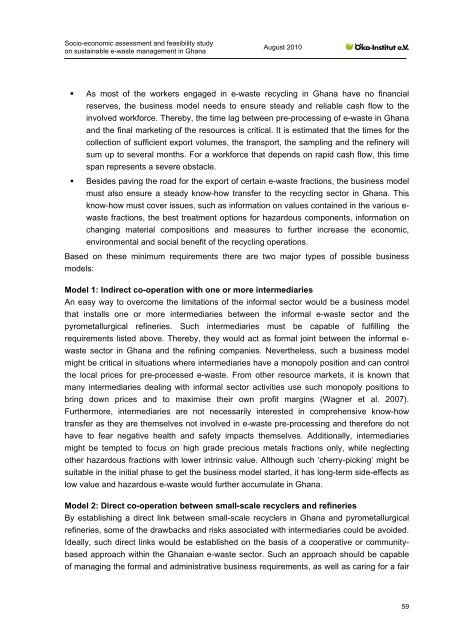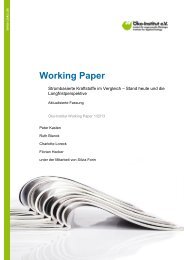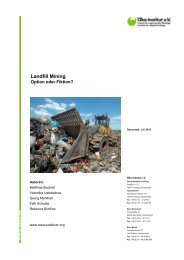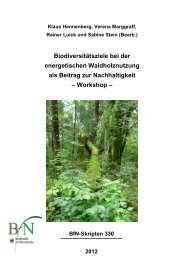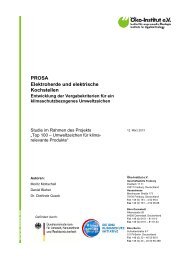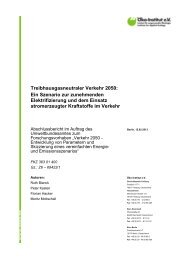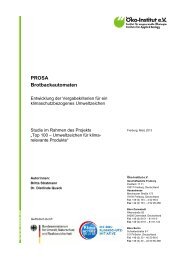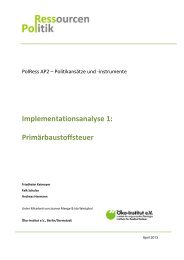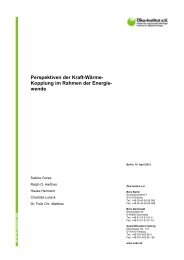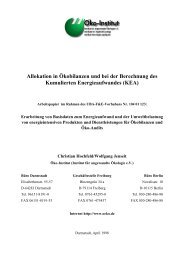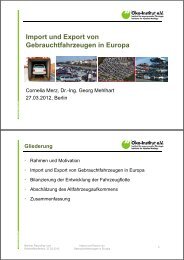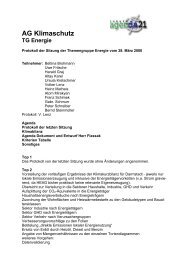Socio-economic assessment and feasibility study on - Öko-Institut eV
Socio-economic assessment and feasibility study on - Öko-Institut eV
Socio-economic assessment and feasibility study on - Öko-Institut eV
You also want an ePaper? Increase the reach of your titles
YUMPU automatically turns print PDFs into web optimized ePapers that Google loves.
<str<strong>on</strong>g>Socio</str<strong>on</strong>g>-<str<strong>on</strong>g>ec<strong>on</strong>omic</str<strong>on</strong>g> <str<strong>on</strong>g>assessment</str<strong>on</strong>g> <str<strong>on</strong>g>and</str<strong>on</strong>g> <str<strong>on</strong>g>feasibility</str<strong>on</strong>g> <str<strong>on</strong>g>study</str<strong>on</strong>g><br />
<strong>on</strong> sustainable e-waste management in Ghana<br />
August 2010<br />
� As most of the workers engaged in e-waste recycling in Ghana have no financial<br />
reserves, the business model needs to ensure steady <str<strong>on</strong>g>and</str<strong>on</strong>g> reliable cash flow to the<br />
involved workforce. Thereby, the time lag between pre-processing of e-waste in Ghana<br />
<str<strong>on</strong>g>and</str<strong>on</strong>g> the final marketing of the resources is critical. It is estimated that the times for the<br />
collecti<strong>on</strong> of sufficient export volumes, the transport, the sampling <str<strong>on</strong>g>and</str<strong>on</strong>g> the refinery will<br />
sum up to several m<strong>on</strong>ths. For a workforce that depends <strong>on</strong> rapid cash flow, this time<br />
span represents a severe obstacle.<br />
� Besides paving the road for the export of certain e-waste fracti<strong>on</strong>s, the business model<br />
must also ensure a steady know-how transfer to the recycling sector in Ghana. This<br />
know-how must cover issues, such as informati<strong>on</strong> <strong>on</strong> values c<strong>on</strong>tained in the various ewaste<br />
fracti<strong>on</strong>s, the best treatment opti<strong>on</strong>s for hazardous comp<strong>on</strong>ents, informati<strong>on</strong> <strong>on</strong><br />
changing material compositi<strong>on</strong>s <str<strong>on</strong>g>and</str<strong>on</strong>g> measures to further increase the <str<strong>on</strong>g>ec<strong>on</strong>omic</str<strong>on</strong>g>,<br />
envir<strong>on</strong>mental <str<strong>on</strong>g>and</str<strong>on</strong>g> social benefit of the recycling operati<strong>on</strong>s.<br />
Based <strong>on</strong> these minimum requirements there are two major types of possible business<br />
models:<br />
Model 1: Indirect co-operati<strong>on</strong> with <strong>on</strong>e or more intermediaries<br />
An easy way to overcome the limitati<strong>on</strong>s of the informal sector would be a business model<br />
that installs <strong>on</strong>e or more intermediaries between the informal e-waste sector <str<strong>on</strong>g>and</str<strong>on</strong>g> the<br />
pyrometallurgical refineries. Such intermediaries must be capable of fulfilling the<br />
requirements listed above. Thereby, they would act as formal joint between the informal ewaste<br />
sector in Ghana <str<strong>on</strong>g>and</str<strong>on</strong>g> the refining companies. Nevertheless, such a business model<br />
might be critical in situati<strong>on</strong>s where intermediaries have a m<strong>on</strong>opoly positi<strong>on</strong> <str<strong>on</strong>g>and</str<strong>on</strong>g> can c<strong>on</strong>trol<br />
the local prices for pre-processed e-waste. From other resource markets, it is known that<br />
many intermediaries dealing with informal sector activities use such m<strong>on</strong>opoly positi<strong>on</strong>s to<br />
bring down prices <str<strong>on</strong>g>and</str<strong>on</strong>g> to maximise their own profit margins (Wagner et al. 2007).<br />
Furthermore, intermediaries are not necessarily interested in comprehensive know-how<br />
transfer as they are themselves not involved in e-waste pre-processing <str<strong>on</strong>g>and</str<strong>on</strong>g> therefore do not<br />
have to fear negative health <str<strong>on</strong>g>and</str<strong>on</strong>g> safety impacts themselves. Additi<strong>on</strong>ally, intermediaries<br />
might be tempted to focus <strong>on</strong> high grade precious metals fracti<strong>on</strong>s <strong>on</strong>ly, while neglecting<br />
other hazardous fracti<strong>on</strong>s with lower intrinsic value. Although such ‘cherry-picking’ might be<br />
suitable in the initial phase to get the business model started, it has l<strong>on</strong>g-term side-effects as<br />
low value <str<strong>on</strong>g>and</str<strong>on</strong>g> hazardous e-waste would further accumulate in Ghana.<br />
Model 2: Direct co-operati<strong>on</strong> between small-scale recyclers <str<strong>on</strong>g>and</str<strong>on</strong>g> refineries<br />
By establishing a direct link between small-scale recyclers in Ghana <str<strong>on</strong>g>and</str<strong>on</strong>g> pyrometallurgical<br />
refineries, some of the drawbacks <str<strong>on</strong>g>and</str<strong>on</strong>g> risks associated with intermediaries could be avoided.<br />
Ideally, such direct links would be established <strong>on</strong> the basis of a cooperative or communitybased<br />
approach within the Ghanaian e-waste sector. Such an approach should be capable<br />
of managing the formal <str<strong>on</strong>g>and</str<strong>on</strong>g> administrative business requirements, as well as caring for a fair<br />
59


